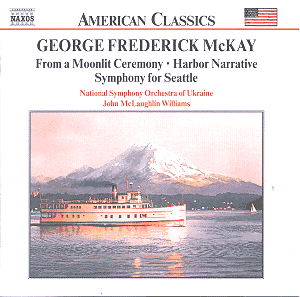George Frederick McKAY
(1899-1970)
From A Moonlit Ceremony (1945) Harbor Narrative (1934)
Evocation Symphony "Symphony for Seattle"
(1951)
 National Symphony Orchestra
of Ukraine·John McLaughlin Williams
National Symphony Orchestra
of Ukraine·John McLaughlin Williams
Recorded at the Grand Concert Hall, National Radio Company of Ukraine Radio,
Kiev, June 1999
 Naxos American Classics
8.559052 DDD
[69:06]
Naxos American Classics
8.559052 DDD
[69:06]
Crotchet
AmazonUK
AmazonUS
Amazon
recommendations

Known as the "Dean of Northwest Composers" George Frederick McKay, like a
number of his contemporary compatriots, spent a lifetime in the multiple
role of composer, educator and administrator. Born into a small farming community
in Harrington, Washington, McKay's first musical experiences were gained
from his Grandfather, a civil war veteran and fiddler, who would sing old
American songs to his grandchildren and encouraged the young George to pursue
music as a career. This he eventually did (after an aborted period of study
for a business degree), subsequently becoming the first composition graduate
of the Eastman School of Music, Rochester. He spent the bulk of his career
as Professor at the University of Washington, Seattle, his pupils including
such future luminaries as William Bolcom and John Cage.
McKay enjoyed great success as a composer during his lifetime, his symphonic
works being championed by Stokowski, Beecham, Howard Hanson and Basil Cameron
amongst others. Since his death in 1970 however his music appears to have
suffered a period of neglect and whilst it is to be hoped that this particular
disc puts his work back on the map it also provides possible evidence that
the quality of his output varied somewhat in its consistency.
Without doubt, the strongest work presented here is the 1951 Symphony
for Seattle. Written in response to a commission celebrating the centennial
of the City of Seattle, the work demonstrates a depth and maturity of language
that seems to belie the mere six years that separate it from the earlier
From a Moonlit Ceremony. There is an economy of expression here, McKay's
clean-limbed melodic writing sometimes bringing to mind Roy Harris, and showing
a clear sense of structure and developmental cohesion. The central Andante
teneramente e pastorale is gloriously beautiful although despite the
conductor's booklet note to the contrary, I felt the distant influence of
Copland on several occasions. My only regret here is the rather thin tone
of the Ukrainian strings, highlighted at a number of points, particularly
where the melody is underpinned by the sonorous sound of the brass. The final
Allegro vigoroso e ritmico receives committed treatment with some
fine brass sounds and a stirringly powerful conclusion. One is left with
the impression that this impressive symphony deserves to be heard in the
concert hall.
Harbor Narrative of 1934 was originally written for piano under the
title Waterfront and subsequently orchestrated, still retaining a
prominent part for the original solo instrument. In nine brief contrasting
movements the work charts a journey by boat around the Puget Sound region
and depicts vividly the varied sights and sounds experienced during the trip.
Whilst the McKay of the symphony is discernible in the slower movements (the
fourth, Chanty, is particularly affecting, floating a lovely oboe melody
over a string accompaniment) there is considerable variety in the quicker
sections including a jazzy 1920's style fox-trot in Voice of the City
and driving machine like ostinati in Men and Machines. The final movement,
Into the Distance, slowly takes the traveller into the mist as the
boat disappears from view.
By contrast, From a Moonlit Ceremony (written eleven years after
Harbor Narrative) is of far less interest being more lightweight in
conception and ultimately failing to capture my imagination. Inspired by
and freely using melodies which McKay noted down whilst observing a ceremony
on the Muckleshoot Indian reservation the work was one of the composer's
most performed compositions during the 1940's yet failed to attract the attention
of a publisher. The version recorded here is the result of a revision in
1969, the year before the composer died.
This disc is well worthy of recommendation for the fine Seattle Symphony
and whilst I am less convinced by some of the other music it is to the credit
of Naxos that we have the opportunity to hear McKay's music once again. John
McLaughlin Williams obtains creditable performances of all three works from
his Ukrainian forces.
Christopher Thomas

